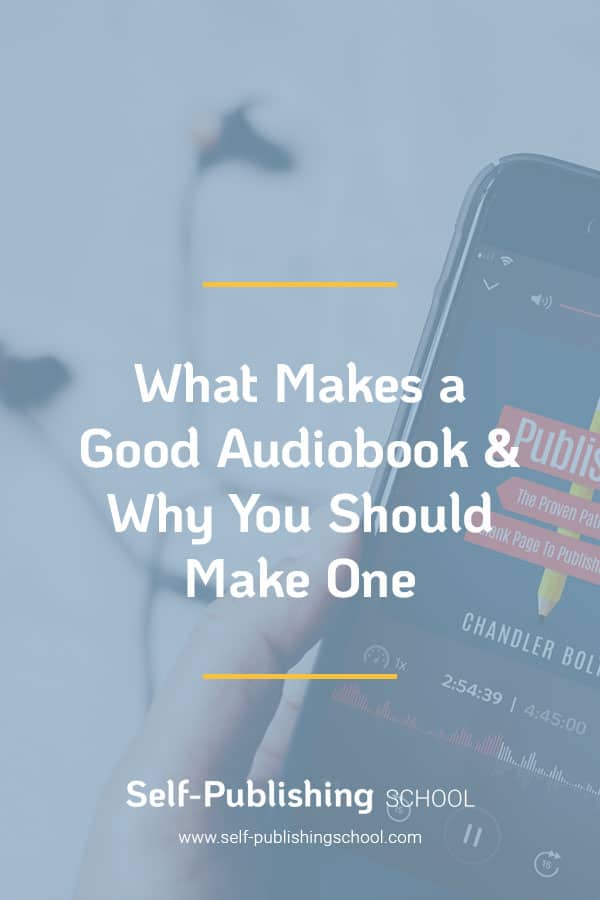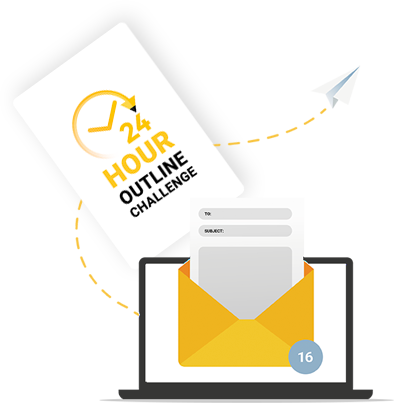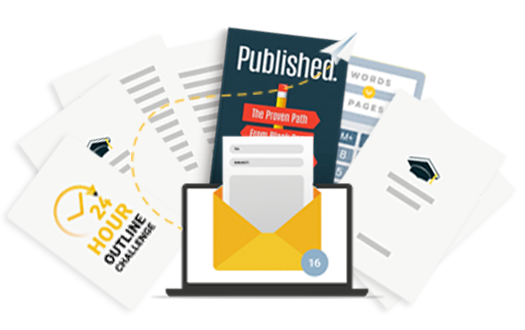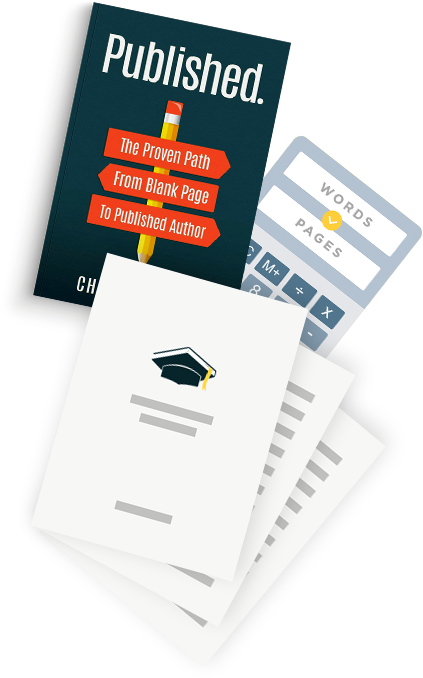Are you listening? Your future readers are.
Is this a familiar scenario:
“The only person in your way is you.”
You nod as the light turns green. Time to go, time to move forward.
“Letting fear drive you will only drive you to disappointment,” the narrator reads his book to you. Your speakers beg for just a little more volume to drown out the traffic.
You lean in and turn it up.
This is what you want for your readers, this is what your current readers are missing, and these are the readers/listeners you are missing by not having an audiobook.
There is an entire audience who have no idea that your book could change their lives. In fact, they don’t even know it exists if they only listen to audiobooks.
Don’t worry! We can fix this, just hang out with me for about 10 minutes or so, and you will be equipped with encouragement, inspiration, and most importantly, a plan!
After writing multiple books and recording my own audiobooks, I’ve learned a few things that will help both green and seasoned writers. With so much useful information packed into one post, we’re going to break it down to some basic questions straight from middle-school English class.
Here’s what we’ll cover in relation to audiobook creation (if you’re in a hurry, skip to 1, 3, and 5):
- WHY make an audiobook?
- HOW do I make an audiobook?
- WHAT makes a good audiobook?
- WHO should narrate the audiobook?
- WHEN should I start on this? (+ Actionable steps)
1 – Why make an audiobook?
Audiobooks are POWERFUL lead magnets.
Benefits include:
The obvious: More Book Sales!
Why not just sell both the digital and the audio? I know the temptation. After investing all this time and money into this audiobook, I need it to “pay” off, so why should I give it away? If that’s a hurdle you can’t get over, at least try using it as a lead magnet for a limited time, then switching to paid. Doing it this way allows for #4 (below) to thrive.
Fewer customer complaints.
When people get an audiobook for free, they are less likely to complain about it, though it still happens. However, this releases you from feeling like you have to have the perfect product. As Chandler says, “done is better than perfect.” We’ll cover more in the ‘how’ and ‘what’ sections.
Audiobook sales.
If you decide to put the book on Audible (the leader in audiobook production) or other sites like Findaway Voices, you will still get sales from people who never took the time to visit your Amazon (or other) page.
The most obvious: Build Your Subscriber List!
Having an author career is a long game. It requires support and a following at the least. This is the point of a lead magnet, to entice readers to sign up for your correspondence. Subscribers by email are gold for an author. Check it out here (and get a free audiobook) to see how the process looks from the subscriber’s side.
None of the other questions matter if we don’t understand our “why.”
As an author, you want to reach a broader audience while also better serving your current readers.
The market for digital and print books is saturated (which isn’t the worst thing), but the audiobook market is still wide open. This is a great time to jump in, stand out, offer more, and expand your reach.
Find out how I “read” 50 books in a year and see which ones they were, but only after you finish reading this post!
Go ahead, right click and “Open Link in New Tab,” and click back over here. This post isn’t going anywhere.
Need some more social proof? How about actual statistics? Here are some highlights from the 2018 global audiobook trends article:
- Audiobooks are growing faster than any other digital publishing.
- Nearly half of all listeners are under 35 and listen to 15 books a year, claiming that “audiobooks help you finish more books.”
- People choose audio for multi-tasking, portability, and the novelty of someone else reading to them.
- Podcasts (another growing industry) are a gateway to audiobooks.
- Some publishers are skipping ebook production and going straight to audio, recognizing that audiobook sales are independently increasing.
Are you convinced yet? Before you go hire someone or crank up your voice memos, read on to see how best to create your audiobook.
#2 – How do you make an audiobook?
SPS has a great post here about how to make an audiobook. It includes tips on prepping your content, recording, hiring narrators, equipment, uploading to ACX (Audiobook Creation Exchange) for Audible, and more.
In addition to those things, here are a few tips from my experience when producing my first audiobook.
- Use two computers or devices. I used one to handle the recording and audio editing (I chose to do simultaneous editing), and the other to read from while revising. No matter how many times you edit your book, you’ll always want to tweak something; recording your audiobook is no exception. If you’ve hired out your formatting, make notes for them of what you’ve changed.
- Keep plenty of water nearby. One time while recording some of my music in a studio, the producer told me to take a drink of water before every take. I didn’t realize how much difference it made until I tried it. Take a deep breath and a big swig before each take.
- Don’t beat yourself up for tripping over words. If it keeps happening, take a break. “Ahh! Can you even read? Come on, Michael!” Believe me, I understand the frustration.
- Invite or hire a professional or semi-professional to help with setup. If you have any musician friends or podcaster buddies, have them help set up your environment and equipment, down to chair placement and lighting. I made the mistake of trying to do it all by myself (cue Eric Carman) and I ended up re-recording my book 1.5 times—that’s 2.5 total! It was a mess.
- BONUS: A crucial piece of advice: listen to audiobooks in your genre. This should sound familiar, as it’s common advice to read the genre you write in, and it’s just as important to listen to it. To be a great writer, you must be an avid reader (and listener!)
With so much screen fatigue, it’s nice to break away and maybe look at, I don’t know, the sky or something real. Try that now…I’ll wait…
Ah, wasn’t that nice?
Let’s get back to business! What makes a good audiobook?
[Pssst! If you want to see some of our Students’ books, check out the SPS Library!]
#3 – What makes a good audiobook?
- Start with a solid foundation: Before producing an audiobook, be sure that you have invested in proper and sound editing, cover design, formatting, and a strong launch plan.
- Cast the right voice (even if its yours): coming up in ‘who’…patience, young grasshopper…
- Conviction: Not only does your book need to be believable, but your narrator needs to convey the same conviction as you did when writing it.
- Eliminate Mouth Sounds: This. Was. A. Pain. You, like me at one point, probably have no idea how much sound your mouth makes, from breath control to saliva and lip smacks. I ended up hiring someone from Fiverr to go through and edit my four-hour audiobook; the cost was around $300, which included mastering (adjusting the levels and frequencies for the specific ACX requirements).
“Is my book right for audio?”
I would argue that ANY book can be useful as an audiobook!
“What about children’s books?”
Imagine the novelty of having the author narrate his/her own work while the kids flip through the pages, all without having to go to a book-reading.
“How about short, daily reads, like religious devotionals?”
My non-fiction book is a weekly devotional for people wanting to grow in worship,
“I’ve got you on this one: cookbooks!”
Au contraire…imagine how helpful it could be to have someone walk you through a recipe in real time, hands-free. If that doesn’t quite work, it can still serve to push people to your digital/physical book for reference and pictures.
In fact, some audiobooks come with companion content such as Good Clean Fun by Nick Offerman.
By now, you’re seriously considering this audiobook thing. Logically, the next thing to work out is WHO should narrate your book.
#4 – Who should narrate my audiobook?
Having a perfect book will not save you from poor narration. Audible makes it a point to offer a Performance section in their reviews.

Did you also notice the tab below for Amazon Reviews? That’s even more reason to get the ‘what’ right in this entire process.
When it comes to narration, there are two ways to go: do it yourself or hire it out.
Narrating Your Own Book:
There a plenty of advantages here. If you choose this route, you can either set up your own recording space or purchase studio time with an engineer.
Many readers will say they prefer authors to narrate their own works because it’s more authentic to the intentions. However, not all writers are great narrators.
I suggest this, a test run:
- Use a phone app or voice recorder and try reading a chapter into it.
- Listen back with objective ears, imagining your ideal reader.
- Ask yourself if you were drawn in to the story or distracted by the narration. Be honest with yourself, and consider what it would take to make it better: cadence, pronunciation, accent, or perhaps a professional narrator. *If you choose to tackle accents, do your best to respect them rather than stereotyping. Audiobook listeners tend to care about accuracy and honor. For example, in England alone, there are half a dozen or more accents. In America, southern accents vary across states and regions.
- Send the sample to an objective friend (preferably one familiar with the accents and style you’re going for), and be open to honest feedback.
If you decide self-narrating isn’t for you, then you can hire a professional.
Tups for hiring a narrator:
- Cost: Narrators can be paid in different ways. ACX offers an hourly rate or a 50% split royalties option. There are other ways as well, such as Upwork, Fiverr, and Voices.
- Voice: fiction or non, nailing the voice is a make-it-or-break-it detail for many listeners. In fact, Audible has an entire section of its reviews dedicated to Narrator Performance. There is a common consensus that says having an non-preferred narrator is one of the biggest turn-offs for listeners.
- Communication: you’ll want to make sure the narrator gets the pronunciations right as well as any specific occasions of sarcasm, humor, drama, timing, or more. They can fix some things in post-production, but changing the pronunciation of a main character’s name after finishing the book would be nearly impossible. It’s not as simple as “Find and Replace” (one of my favorite word processing functions!). ACX has great videos to help with such things.
- More tips: ACX | AME | Stacked

#5 – When to start making an audiobook?
If this post has stirred you up at all, then you must act!
You and I both know this to be true, so here are some things you can do right now to become a better writer and jump start your audiobook production.
- Try the self-narrating tip from #4. For me, I’ve always loved doing impressions and finding new voices and accents. In fact, it has influenced my writing; I now try to include characters whose voices I know I can give life to. Recently, I made one of my characters Scottish, an accent I’ve always admired and respected.
- Get started listening with Audible right now if you haven’t already, and start reading reviews, specifically in the Performance section. There are also plenty of free audiobook sources out there.
- Continue polishing your book as best you can. Adjustments to the written word are fairly easy, but punching in seamless narration is nearly impossible. It doesn’t have to be perfect though! There is always the option to re-record your book (and likely be even better the next time around) or hire someone else to do it.
- Read the SPS post about making an audiobook, and revisit the myriad links in this post.




